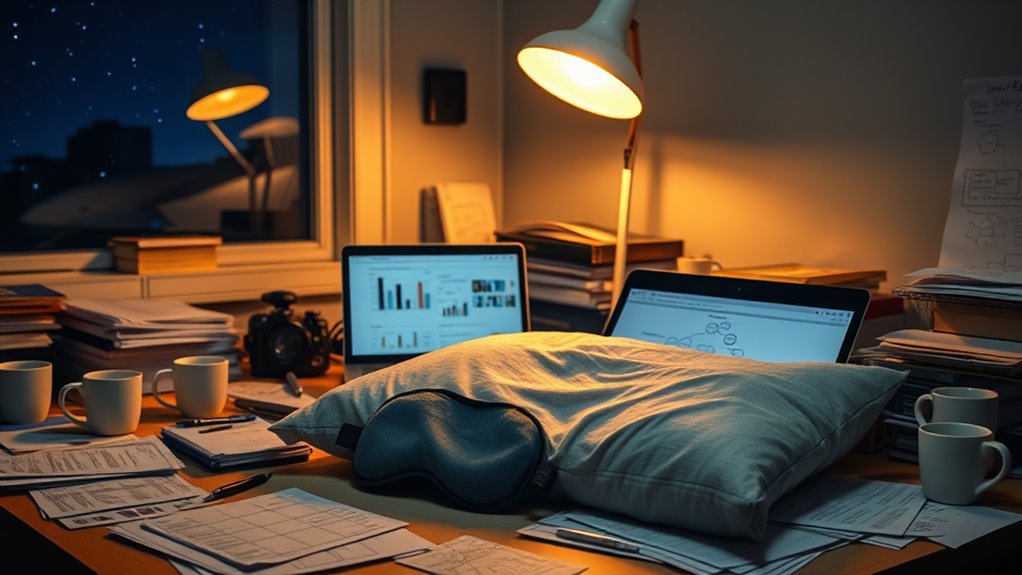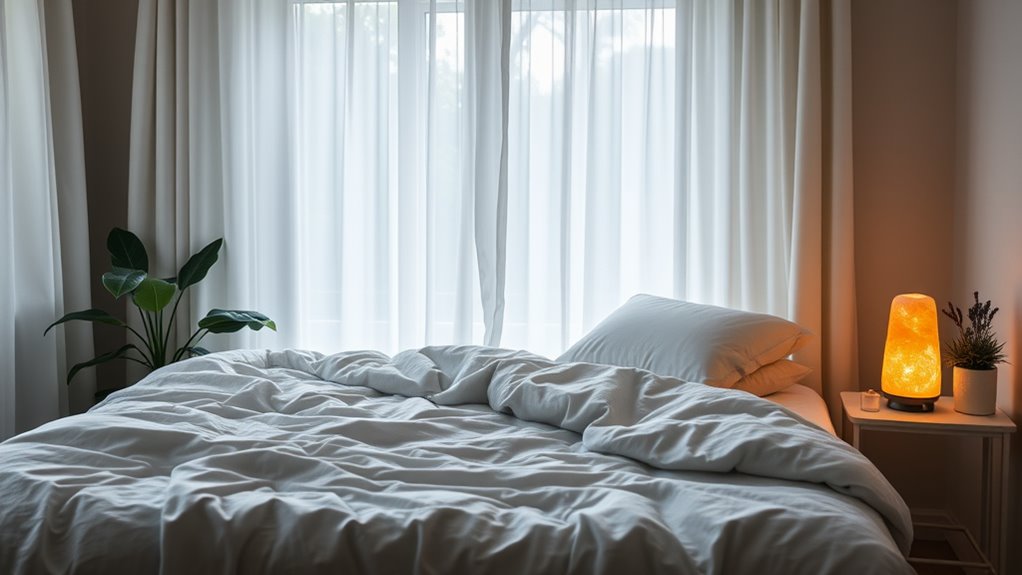
Improving your productivity starts with tackling poor sleep hygiene. Lack of quality sleep diminishes your focus, accuracy, and decision-making, leading to more errors and slower reaction times. You might find your memory foggy, making it tough to learn new skills or remember key information. Consistent lack of sleep can also impair your mood and judgment, straining relationships and increasing stress. Conversely, sticking to a regular sleep routine enhances cognitive performance and job satisfaction, while reducing absenteeism. Start by optimizing your sleep environment and limiting evening stimulants. Discover how these changes can transform your work and life.
Effects of Poor Sleep on Work
Poor sleep can seriously undermine workplace performance and productivity. When sleep deprivation becomes a norm, your ability to stay accurate and efficient plummets. It leads to increased errors and mistakes, dragging down the quality of your work and extending the time needed to complete tasks.
Emphasizing sleep quality isn’t just about personal health—it’s essential for fostering a productive workplace culture where fatigue management is prioritized. Regular exercise is a proven stress reliever that can enhance sleep quality, leading to improved mood and clarity.
By aligning your circadian rhythms with a balanced work-life routine, you can support employee wellness and boost work morale. Poor sleep fuels irritability, mood swings, and stress, which strains your relationships with colleagues and supervisors.
Managing stress through better sleep habits can enhance empathy and interpersonal skills, ensuring smoother interactions and reduced conflicts.
An organization that prioritizes stress reduction and employee wellness cultivates a positive workplace culture where collaboration thrives. By addressing and improving sleep quality, you directly impact job satisfaction and reduce absenteeism and tardiness.
This not only nurtures teamwork but also fortifies the organization against economic pitfalls related to poor performance. Don’t let subpar sleep hold your potential hostage—embrace liberation through better rest and watch your work life transform.
Cognitive Decline Due to Sleep Loss
When you don’t get enough sleep, your ability to pay attention and focus diminishes considerably, making it harder to tackle tasks efficiently. Sleep loss also hinders your memory retention, affecting both short-term recall and your capacity to learn new things. As your decision-making skills take a hit, you’re more likely to make errors, impacting your overall productivity and cognitive health. To improve your sleep, consider limiting caffeine intake after noon, as it can interfere with your ability to fall asleep quickly.
Impaired Attention and Focus
Sleep loss markedly impairs attention and focus by affecting essential regions of the brain. Your prefrontal cortex, significant for attention strategies and decision-making, takes a hit, leading to depleted attentional resources. This makes it harder to deploy focus techniques and concentrate on tasks.
Meanwhile, the anterior cingulate cortex gets sluggish, compromising your ability to detect errors and monitor conflicts. Reaction times slow down, and accuracy slips, hindering your productivity.
The battle doesn’t stop there. Chronic sleep deprivation can cause long-lasting changes in brain structure and function, including the parietal lobe, which affects how you process sensory information.
Here’s how impaired attention manifests:
- Lowered cognitive processing speed: Tasks take longer, and distractions become harder to ignore.
- Executive function disruption: Planning, problem-solving, and multitasking falter, making you feel trapped in inefficiency.
- Imbalanced neurotransmitters: Disrupted levels of dopamine and norepinephrine hinder motivation and focus.
Liberate yourself from these chains by prioritizing proper sleep hygiene. It’s not just about more hours; it’s about better quality sleep that fuels your mind and empowers your daily life.
Embrace strategies that detoxify your mind and elevate your focus.
Memory Retention Challenges
As attention and focus falter due to inadequate sleep, memory retention doesn’t escape unscathed. The hippocampus, essential for forming short-term memories, struggles without sufficient rest. You may find your ability to learn new things impaired, with short-term memories failing to cement into long-term ones.
Even missing a few hours of sleep can leave your short-term memory in tatters, hindering daily learning and recalling vital information. Long-term memory also suffers when you’re sleep-deprived. Your brain requires adequate sleep to consolidate memories—strengthening the neural connections that help you recall information later.
If you’ve noticed forgetting things you used to remember easily, sleep loss might be the culprit. This degradation impacts both declarative (facts and knowledge) and procedural (skills and tasks) memory.
Neurochemical imbalances caused by lack of sleep hamper your brain’s ability to retain information. Disrupted levels of acetylcholine, norepinephrine, and increased stress hormones create a challenging environment for memory retention.
However, by adopting effective sleep techniques and memory strategies, you can reclaim your cognitive edge. Refining your sleep hygiene releases your brain’s full potential, empowering you to live with freedom from forgetfulness and mistakes.
Reduced Decision-Making Skills
Decision-making takes a significant hit when you’re sleep-deprived. Your executive function, critical for planning and problem-solving, suffers noticeably. The prefrontal cortex—essential for evaluating risks and benefits—falters, leaving you prone to impulsive choices. As a result, even mild sleep deprivation can derail your ability to make sound decisions, restraining your liberated mind.
When you’re low on shut-eye, your attention wavers, creating gaps in focus and clarity. It’s easy to overlook critical details, resulting in frequent mistakes.
Consider these consequences:
- Impulsive Choices: Sleep deprivation blinds your ability to foresee long-term outcomes, often leading to spur-of-the-moment decisions.
- Emotional Bias: Increased emotional reactivity can skew your decisions, reducing the effectiveness of your emotional regulation.
- Cognitive Rigidity: Your cognitive flexibility shrinks, hindering your ability to adapt and think creatively.
Sleep is fundamentally connected to your ability to regulate emotions. Lack of rest amplifies emotional biases, leading to decisions fueled by immediate emotional responses instead of rational thought.
Decision-Making and Sleep Deprivation

When you’re sleep-deprived, your cognitive abilities take a hit, making it harder to pay attention and react quickly. This sluggishness can blur your judgment and lead to poorer decision-making, especially in high-pressure situations. Sleep deprivation can also exacerbate existing health issues and contribute to serious conditions like heart disease and depression. Prioritizing sleep is essential because your decisions don’t just affect you—they influence the success and safety of your team and projects.
Cognitive Impairment Effects
Sleep deprivation undermines your ability to make sound decisions by affecting the prefrontal cortex, an essential part of the brain responsible for judgment and risk assessment.
When you’re sleep-deprived, your capacity for cognitive flexibility and emotional intelligence takes a hit, leading to more rigid thinking and less empathy. This means you’re more likely to make reckless decisions without considering all possible outcomes or understanding others’ perspectives.
Consequently, your reliance on habitual patterns grows, steering you away from creative problem-solving.
Emotional upheaval further clouds your judgment, as you’ll find it challenging to control irritability and mood swings. This emotional instability can elevate stress levels, pushing decisions driven more by impulse than by reason.
Here’s what to remember about how sleep deprivation impacts decision-making:
- Impaired Judgment: You become more prone to risky decisions without fully weighing the consequences.
- Limited Perspective: The ability to see issues from multiple angles is diminished, narrowing your decision-making lens.
- Increased Habit Reliance: Instead of rational thinking, you default to ingrained habits, potentially stalling personal growth.
To break free from these cognitive chains, prioritize proper sleep to reclaim your decision-making prowess!
Sluggish Reaction Times
Beyond simply impairing judgment, lack of rest takes a toll on your quick-thinking abilities, creating a sluggish reaction time that can seriously affect day-to-day activities. When you’re sleep-deprived, your brain’s ability to process information promptly is compromised, leading to slower reflexes and delayed response times.
This decline in cognitive performance isn’t just theoretical; it can make everyday activities like driving or even cooking perilous. Your coordination and balance suffer, setting the stage for mishaps and accidents that could alter your life in an instant.
Sleep deprivation impacts the neurotransmitters responsible for alertness and attention, further sabotaging your reaction time. These neurochemical imbalances, particularly in areas like the prefrontal cortex, slow down your ability to react swiftly.
In work settings, this becomes a productivity killer, making tasks drag on longer than needed and increasing stress. Plus, social interactions may falter, as your delayed responses could be perceived as inattentiveness or disinterest.
Don’t let this be your norm. Embrace better sleep hygiene for a quicker mind and agile reactions. Time is precious—your liberation lies in reclaiming the energy and alertness good rest provides.
Judgment Under Sleep Deficit
Decision-making under sleep deprivation becomes a risky endeavor that jeopardizes your ability for careful deliberation. When you’ve been deprived of sleep, your ability to weigh options with precision suffers. Instead of relying on the robust, reflective process you’re used to, you become prone to impulsivity, leaning toward high-risk approaches in decision-making.
It’s a cocktail of uncertainty that disrupts risk assessment and distorts your moral judgment. Your usual gathering of facts shrinks, and the evidence you demand diminishes, leading to flawed conclusions. Sleep deprivation has been shown to reduce information collection and increase risk propensity in cognitive tasks, impacting habitual decision-making styles and increasing impulsivity.
Here’s why sleep loss can be detrimental:
- Analytic Impairment: You struggle to make analytic evaluations of risks and benefits, curtailing your strategic thinking.
- Emotional Disruption: Sleep deprivation muddles the blend of emotion and cognition, making moral judgments more lenient or misguided.
- Neural Dulling: Your brain’s response to success and failure dulls, skewing risk-taking behaviors and reducing adaptability to changing situations.
Even moments requiring sharp moral judgment get tangled in emotional discord when you’re sleep-deprived. You’re not just oscillating between right and wrong; your interpretation of emotional cues skews reactions toward negativity.
Break free from this cycle by valuing sleep as a vital component of your decision-making arsenal.
Mood Stability and Productivity
In today’s fast-paced work environment, maintaining mood stability is essential for sustained productivity. When sleep deprivation takes its toll, mood fluctuations become a significant hurdle. You may notice troublesome interpersonal interactions and an impediment to emotional resilience. It’s vital to be aware of how poor sleep affects your response to positive stimuli, making you focus more on perceived negatives. This imbalance can lead to misjudgment and miscommunication, adding tension to your daily interactions. In fact, a study found that improving sleep quality could enhance work productivity, emphasizing the importance of good sleep hygiene. Proper nutrient intake, like essential amino acids, in the first 48 hours post-exercise can also significantly contribute to overall well-being and recovery.
To visualize the impact of sleep on your mood and relationships, consider this table:
| Sleep Deprivation Effects | Mood Fluctuations Impact | Emotional Resilience Challenge |
|---|---|---|
| Increased negativity focus | Misjudgment at workplace | Diminished social interaction |
| Altered emotional processing | Social withdrawal | Conflicts with team |
| Heightened emotional reactivity | Unusual quietness | Negative demeanors |
| Difficulty in clear thinking | Strained relationships | Decreased collaboration |
With excessive sleepiness, you may face aggressive behavior, mood disorders, and a negative demeanor that strains workplace dynamics. This affects not only your productivity but also team collaboration and harmony. Ensuring a good night’s sleep and improving sleep hygiene can liberate you to reach your highest potential, fostering a positive and productive environment.
Absenteeism Linked to Sleep Issues

Often overlooked, sleep issues play a significant role in workplace absenteeism, impacting both productivity and economic outcomes. If you think about it, a poor night’s sleep affects your ability to show up and perform.
Nearly 27% of Australian workers miss work every month due to sleep problems, while poor sleepers in the U.S. miss about 2.29 days per month compared to the 0.91 days missed by their well-rested counterparts. These absences not only stall career growth but hit your wallet and well-being where it hurts the most.
To grasp how sleep health impacts workplace wellness, consider these points:
- Economic Burden: In the U.S., absenteeism due to sleep issues costs employers $44.6 billion annually. Australia follows suit with a $32.5 billion productivity loss.
- Target Factors: Younger workers, those with poor sleep quality, and women are particularly prone to absenteeism.
- Lifestyle Impact: Irregular hours, excessive sleepiness, and sleep medications often correlate with higher absenteeism rates.
Chronic stress negatively impacts sleep quality and duration, increasing the likelihood of workplace absenteeism. Imagine a workplace where everyone’s aware of their sleep health’s influence on productivity. Addressing these issues isn’t just about reducing missed workdays; it’s about fostering an environment where everyone thrives in workplace wellness.
Benefits of Consistent Sleep Schedule
Understanding the significant role sleep plays in reducing absenteeism invites us to explore the myriad benefits of maintaining a consistent sleep schedule. Just imagine, a rhythm that not only elevates your mood but also promises health improvements and sharper mental acuity. Embracing regular sleep patterns can transform your days and nights.
By sticking to a steady schedule, you’re 30% less likely to face mortality risks and can enjoy improved cardiovascular health, potentially adding years to your life. The reliable rhythm boosts your immune system, keeping you in action rather than sidelined by sickness.
And let’s not overlook your metabolic advantages. A well-aligned sleep-wake cycle even supports digestion and combats those stubborn metabolic issues like diabetes and hypertension.
Mentally, the sleep benefits are profound. A consistent sleep schedule fosters mood stability and minimizes anxiety, letting you meet each day with a clear head, ready to conquer life’s challenges.
Your focus sharpens, decision-making enhances, stress levels drop, and irritability fades away. The cognitive boost doesn’t stop there—better performance and alertness become your new norm.
This simple habit upgrade empowers not just your productivity, but your overall sense of freedom and well-being.
Creating an Optimal Sleep Environment

Crafting a serene sleep sanctuary can greatly boost your rest quality and overall well-being. Start by focusing on the ideal sleeping temperature, which is between 18–22 degrees Celsius (65-68 degrees Fahrenheit). A cooler room helps induce the REM sleep necessary for revitalization. Use breathable materials like cotton or linen to keep your body temperature optimal.
Consider keeping a window or door slightly open for better air circulation.
Noise management is vital for undisturbed slumber. A silent setting prevents sleep fragmentation and enhances tranquility. Implement noise-blocking strategies such as earplugs, noise-blocking curtains, or a white noise machine.
Soothing ambient sounds can also lull you into a peaceful state.
Light control is important for natural melatonin production. To keep your space dark, install blackout curtains or shades. It’s beneficial to dim lights and steer clear of strong illumination near bedtime.
For a more liberating sleep experience, embrace minimalistic bedroom design.
To skyrocket your sleep quality:
- Declutter the space of distractions.
- Guarantee comfort essentials like a supportive mattress and pillow.
- Harness aromatherapy benefits with calming essential oils to fill your space.
Avoiding Evening Stimulants and Electronics
To enhance your restful oasis, consider the impact of your evening habits, specifically stimulants and electronics. Ditch caffeine in the late afternoon or evening to prevent insomnia. Coffee, tea, and even chocolate might seem comforting, but they block sleep-promoting adenosine, delaying your journey to dreamland. Instead, embrace caffeine alternatives like herbal teas or warm milk to soothe your senses.
Evaluate the timing of any prescription or over-the-counter medications. ADHD meds or antihistamines, for instance, can be sneaky saboteurs of slumber. Supplements and nicotine carry similar risks. Choose an empowering evening routine focusing on relaxation rather than stimulants—your body’s plea for freedom.
Electronics can be a major disruptor. Blue light from screens blocks melatonin, the sleep hormone, potentially imprisoning you in wakefulness. Free yourself by shutting down screens at least an hour before bed. Immerse yourself in calming activities like a good book or a warm bath to signal bedtime’s approach.
Let your bedroom be a sanctuary—a cool, dark escape, shedding the chains of stress and inviting rest. Embrace this liberation, and let your nightly habits pave the way to your most productive, rested self.














